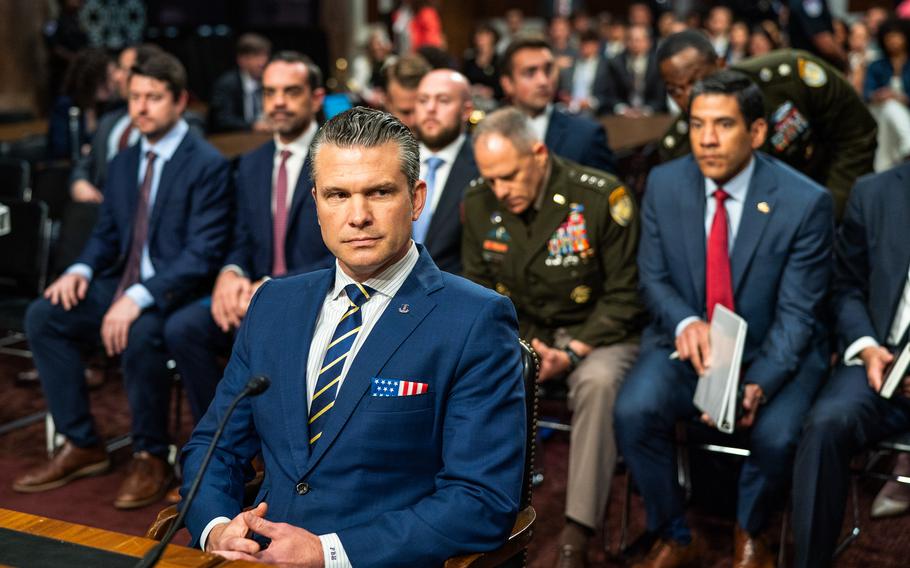
Justin Fulcher, far left, is seen at a Senate Armed Services Committee hearing on June 18 with Hegseth and other senior Pentagon officials. (Demetrius Freeman/The Washington Post)
Another senior aide to Defense Secretary Pete Hegseth is leaving the Pentagon, officials said Saturday, marking at least the sixth departure of a top adviser in Hegseth’s first six months in office.
Justin Fulcher, who was named a senior adviser to the defense secretary in late April, said in a text message to The Washington Post that his departure is “perfectly amicable” and that he planned all along to complete just six months of government service. He said he is grateful to Hegseth, President Donald Trump “and to the extraordinary civilians and service members who turn vision into action every day.”
“Working alongside the dedicated men and women of the Department of Defense has been incredibly inspiring,” Fulcher said.
Sean Parnell, a Pentagon spokesman, acknowledged Fulcher’s departure in a text message, after CBS News first reported that Fulcher had been fired. Parnell said it was “not fair” to characterize the exit as a firing and called Fulcher a “great guy.”
The Pentagon also issued a short statement from Parnell that said the Defense Department is grateful to Fulcher “for his work on behalf of President Trump and Secretary Hegseth. We wish him well in his future endeavors.”
Hegseth, a former Fox News personality, came to the Cabinet job with little prior managerial experience and has struggled to achieve cohesion among his inner circle of aides. The staff churn, along with Hegseth’s other early missteps, has drawn sharp scrutiny from Congress and, at times, the White House.
The latest shake-up follows a report by The Post published Tuesday that detailed an unusual situation ahead of his appointment in April in which Fulcher — then a member of billionaire Elon Musk’s U.S. DOGE Service — stormed out of a meeting with the Pentagon’s DOGE team lead, Yinon Weiss, and sought help from Hegseth’s front office.
As The Post reported, Fulcher told Hegseth and other senior officials in the secretary’s office that he thought the Pentagon Force Protection Agency, an internal police and security organization, was looking for him. That upset Hegseth, who then summoned Weiss to his office and confronted him, raising his voice at times, people familiar with the altercation said.
Weiss, a tech entrepreneur who had just taken over as the Pentagon’s DOGE team lead, denied having called law enforcement, telling Hegseth that instead he had reported Fulcher to a government official with the Defense Department transition office that assists newly arriving political appointees, a person familiar with the encounter said.
Hegseth brought Fulcher onto his team days later, after he fired three other senior advisers and accused them of leaking information to the news media. They have emphatically denied the accusation, and the Pentagon has disclosed no evidence backing the allegations.
Fulcher was embroiled in additional controversy last month after the Guardian reported that he told Hegseth’s personal attorney, Tim Parlatore, and Hegseth’s chief of staff at the time, Joe Kasper, that he knew of surveillance measures that could be used to find leakers in the Pentagon.
Fulcher joined Parlatore in the search for suspected leakers, but officials at the White House and in the Pentagon later determined that Fulcher had exaggerated his usefulness and the purported evidence he had alluded to did not exist, people familiar with the matter said. In light of that, some of Hegseth’s other advisers began to cast doubt on Fulcher’s standing in the administration.
Within the Pentagon, there was speculation for days that Fulcher’s departure was imminent, but on July 11 administration officials said in a statement to The Post that he was still a senior adviser to the secretary and gave no indication that was changing. Fulcher, too, said then that he was still on the team without disclosing that he would be leaving soon.
Fulcher’s workspace had recently been relocated outside of Hegseth’s main office to a desk down the hall, but he previously told The Post the move was temporary and occurring because of maintenance work. Others familiar with the situation affirmed that the move appeared to be temporary, but some said that it had raised new questions as Hegseth has worked to suppress any perception of persistent dysfunction.
Other members of Hegseth’s team who have departed include Dan Caldwell, Colin Carroll and Darin Selnick, the three fired in April; Kasper, who voluntarily left his role for the private sector that month, and John Ullyot, who served for a few months as the Pentagon’s top spokesman.